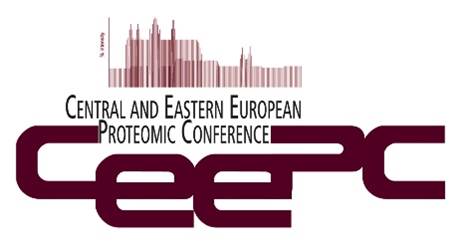- HOME
- Vienna 2024
- Lithuania 2023
- 16th CEEPC Prague 2022
- Proteome & Proteomics
- Proteomics Potentiality
- Precision Medicine & Cancer
- Proteomics and COVID-19
- Big Data & AI
- Spotlight Lithuania
- Humanity
- Meeting Reports & Tributes
- Country Profiles
- Proteomic Snippets
- Enabling Advances
- Spotlight Czech Republic
- Spotlight Poland
- 13th CEEPC - Ustron, Poland
- Spotlight Romania
- 12th CEEPC - Bucharest
- Spotlight Slovakia
- Spotlight Macedonia
- Sports Medicine
- Contacts & Copyrights
Emerging Macedonia & thirst for excellent Proteomics
CEEPC Country Focus: 'The Republic of North Macedonia'.

Logos, photos & graphics with permission
Synopsis: In keeping with CEEPC intentions and ethos, Macedonia was invited to join in 2014 and this ‘spotlight focus’ gives an insight into their academic activities, ambiance and aspirations.

Macedonia
CEEPC Representative for Macedonia: Katarina Davalieva, PhD

Macedonian Academy of Science and Arts (MASA)
Institute: Research Center for Genetic Engineering and Biotechnology “Georgi D. Efremov” (RCGEB), Macedonian Academy of Sciences and Arts (MASA), Av. Krste Misirkov 2, 1000 Skopje, Republic of Macedonia

RCGEB was founded in 1986 as a research unit of MASA (http://www.manu.edu.mk/) with the main goal of advancing scientific knowledge in the field of molecular biology, genetic engineering and biotechnology. The center is located in the building of the MASA and has about 500 m2 laboratory space and 250 m2 office space. In the first years after foundation in 1986/87, the primary research interest in the RCGEB was the study of the molecular basis of the most common monogenic diseases. The later research has spread to other rare monogenic diseases and some complex conditions such as infertility and cancer. The advancement of technology platform at the RCGEB, assisted by the European Commission FP7 infrastructural grant "National Reference Laboratory for Genomics and Proteomics-MACPROGEN" and support from the Government of the R Macedonia, provided conditions for implementation of genomics and proteomics research. At present, the RCGEB is structured in 3 departments: Department for Proteomics, Department for Genomics and Department for Molecular Diagnostic.
The proteomics research in the RCGEB is focused on protein expression profiling of complex diseases/conditions such as cancer, male infertility and neuropsychiatric disorders. The main aim of this research is elucidation of the disease mechanisms through whole proteome comparison of diseased and healthy tissues and search for non-invasive screening/diagnostic biomarkers through proteomics analysis of body fluids. The Department for Proteomics uses 2-D DIGE/MALDI-TOF and label-free shotgun profiling with nano-LC-MS/MS to perform these comparisons.
Projects: Current 'on-going' projects and funding
-
Building the Schizophrenia research in the Republic of Macedonia
NIMH-Fogarty Foundation (2012-2017)
-
Detection of urinary biomarkers for urogenital cancers with the use of 2D-DIGE/MALDI MS and LC-MS technology
Macedonian Academy of Sciences and Arts (2015-2017)
Schematic of major research projects and facilities

Collaborations: Current 'on-going' collaborations and their focus
1) Collaboration with Molecular Imaging and Neuropathology Department, New York State Psychiatric Institute, Columbia University, NY, and Quantitative Proteomics Center, Department of Biological sciences, Columbia University, NY, to train and equip Macedonian scientists and institutions for state-of-the-art use of electron microscopy, stereology, image analysis, RNA-seq, and label-free proteomics in the studies of white matter in schizophrenia.
2) Collaboration with University clinic for Urology, Medical Faculty, University “St. Cyril and Methodius”, Skopje, Republic of Macedonia, to identify urinary proteins that can be used as noninvasive diagnostics biomarkers for urogenital cancers such as kidney, bladder and prostate cancer. More specifically, this study aims to evaluate the potential of the limited set of urinary proteins which show the highest specificity to be used as diagnostic markers of prostate cancer.
Publications: Recent publications
-
Katarina Davalieva, Sanja Kiprijanovska, Selim Komina, Gordana Petrusevska, Natasha Chokrevska Zografska and Momir Polenakovic. (2015) Proteomics analysis of urine reveals acute phase response proteins as candidate diagnostic biomarkers for prostate cancer. Proteome Science 2015, 13:2.
-
Katarina Davalieva, Ivana Maleva, Sanja Kiprijanovska, Katerina Kubelka-Sabit, Vanja Filipovski, Sotir Stavridis, Oliver Stankov, Selim Komina, Gordana Petrusevska and Momir Polenakovic. (2015) Proteomics analysis of malignant and benign prostate tissue by 2-D DIGE/MS reveals new insights into proteins involved in prostate cancer. The Prostate, 75 (14): 1586–1600.
-
Katarina Davalieva, Ivana Maleva and Andrew Dwork. (2016) The proteomics research in schizophrenia. Frontiers in Cellular Neuroscience, 10: 18. (DOI = 10.3389/fncel. 2016.00018)
Offerings: biological samples, services and expertise
-
We have biobank of tissues, urine and plasma from patients with prostate cancer, bladder cancer, renal cancer and patients with benign prostate hyperplasia.
-
The Proteomics department at RCGEB has been dedicated to proteomics using the technique of 2D electrophoresis as separation method and peptide mass fingerprinting (PMF) for protein identification from its establishment. We have a great expertise in 2-D DIGE (2-Dimensional Differential In-Gel Electrophoresis), MALDI-TOF MS and Western blot analyzes. In addition we do microbial identification using MALDI-TOF-SARAMIS. Recently we have implemented label-free shotgun proteome profiling and TOF-MRM method which provides the ability to carry out ultra-sensitive quantitation of multiple target analytes, over a wide dynamic range with the advantages of high resolution and accurate mass. Our center is open to academic and private laboratories.
Quest: We are open to collaboration on research projects close to our research interest or projects where we can provide technical expertise. We welcome collaborations equally with academic and industry partners leading to new funding and scientific opportunities.
Vision: To host the CEEPC Meeting in Skopje, Macedonia in the near future!
Keywords: Proteomics, genomics, biomarkers, prostate cancer, mental disorders.

CEEPC prides itself as a 'Treasure Trove' of Central and Eastern European Cultures and includes Macedonia with its exciting 6 ‘C’s –
Colour, Culture, Costume, Cuisine, Contours & a wonderful Capital
- see for yourself !
Colours
Culture
Costumes
Cuisine
Contours
Capital
Skopje
 Advancing Proteomics and building bridges!
Advancing Proteomics and building bridges!








